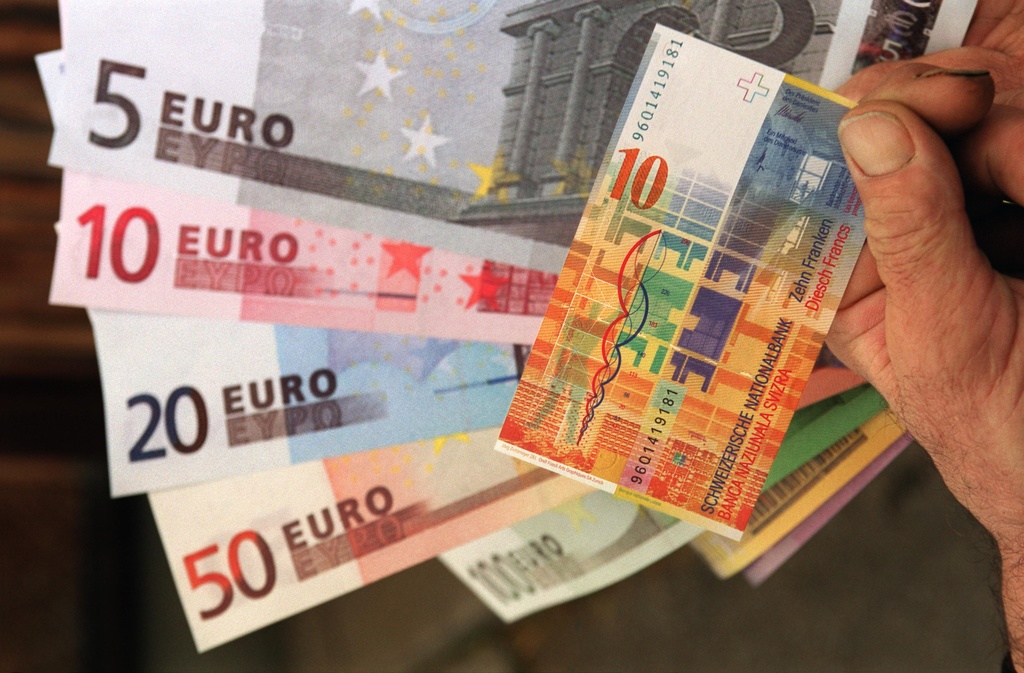Greece faces “Herculean task”

The Swiss press believe Sunday’s announcement by eurozone ministers to bail out debt-crippled Greece is necessary but not without risk.
“Belt tightening”, “crash diet” and “bitter pill” were frequent phrases in editorials on Monday, a day after the European Union and the International Monetary Fund agreed on a €110 billion (SFr158 billion) aid rescue.
Eurozone ministers, meeting in an emergency session, approved the three-year package of emergency loans after Greece committed itself to the painful austerity measures that have sent thousands of Greeks into the streets in protest.
The Greek drama was the top story in Zurich’s Tages-Anzeiger, whose editorial said there was “simply no alternative” to providing financial aid.
“The Greeks are certainly not receiving [the rescue package] out of sympathy and definitely not out of solidarity from their eurozone partners. Its sole aim is to stabilise the exchange rate and to prevent the debt crisis spreading to other euro states.”
The only question that people should be asking themselves was how this bought time would be used, the newspaper said.
The answer, in its eyes, was a three-parter: first, Greece had a responsibility to come up with detailed plans on implementing the aid packet, “however painful the consequences for most Greeks”. Second, other European states that were “on the ropes” had to initiate a credible reform programme. Finally, the eurozone itself needed to strengthen its institutions.
Der Bund, in Bern, also headlined with Greece and said the national finances in Europe were a potentially considerable risk for Switzerland. It quoted Philipp Hildebrand, president of the Swiss National Bank (SNB), who warned that a wobbly euro would automatically have a negative effect on “safe haven” Switzerland.
A strong franc hampers Swiss exports because they become expensive and it also puts a brake on tourism. The SNB has spent more than SFr40 billion ($37.2 billion) buying up euros this year to prevent the Swiss franc from gaining further in value.
“Crash diet”
Der Bund also examined the discontent felt among the Greek population, saying they didn’t want to bleed for mistakes made by their government. It quoted a headline in a Greek newspaper: “Greece saved – Greeks destroyed”.
The main picture on the front page of the Fribourg-based La Liberté was of a Greek riot policeman in front of flames at a May 1 demonstration in Athens.
The Basler Zeitung said few nations were as skilful at frittering away money as the Greeks. One of the many “dodgy” schemes it listed was the 40,000 unmarried or divorced daughters of government officials who can inherit their deceased parent’s pension, costing the state some €550 million a year.
Le Temps in Geneva believed the “crash diet” imposed on Greece was a “dangerous cure” that would “mercilessly hit the most disadvantaged members of society”.
“The [IMF aid] will certainly enable Greece to keep its head above water, but it won’t be enough to help it out of the water. Greece is changing creditors, but it isn’t free of the hellish cycle of debt.”
“Greeks receive money but no blank cheque,” was the headline in the Tribune de Genève, which said the eurozone ministers had agreed a quid pro quo deal that would force the Greek government to tighten its belt. It too acknowledged that it wouldn’t go down well with the Greek in the street.
Tabloid Blick on the other hand reckoned it was “raining money” over Greece last night, adding that Swiss banks played a side role in the affair, housing billions of euros gained from Greek tax fraud.
Unprecedented
The Berner Zeitung also talked of a “drastic cure” and described the measures agreed as “draconian”, which, classicists will know, derives from Draco, an Athenian legal scribe under whom small offences had heavy punishments.
The classical references continued in the Neue Zürcher Zeitung, which, next to a picture of protestors attacking riot police in Athens, quoted Greek Prime Minister George Papandreou as saying his government faced a “Herculean task”. The paper said the country’s “unprecedented modernisation” would also require great sacrifices from the population.
Frontpage of the week goes to The Economist in London: “Acropolis Now” was how it titled its latest edition, referring to Francis Ford Coppola’s 1979 Vietnam classic, Apocalypse Now. Over pictures of EU helicopters swooping to the aid of Athens, a combat-clad Angela Merkel is muttering “the horror, the horror”, the last words in the film of Colonel Kurtz, a highly decorated officer who goes renegade.
“There comes a moment in many debt crises when events spiral out of control … The Greek crisis – or more properly Europe’s sovereign-debt crisis – looked dangerously close to that,” said the paper’s editorial, admittedly before Sunday’s deal was announced.
United States President Barack Obama said on Sunday he welcomed Greece’s ambitious reform programme and praised the support Athens had from fellow eurozone members.
However, Papandreou struck a more sombre note. “It is an unprecedented support package for an unprecedented effort by the Greek people,” he said during a televised cabinet meeting while wearing a dark purple tie, the colour used for funerals in Greece.
Thomas Stephens, swissinfo.ch
European nations aim to formally launch the biggest-ever financial bailout of a country this week, hoping to calm markets wary that Greece’s rescue may be the first of several, expensive measures to shore up other economies.
The euro fell on Monday despite the EU/IMF bailout announced at the weekend on doubts about whether Greece can sustain the austerity measures it has promised in exchange for the €110 billion euro (SFr158 billion) package and if other eurozone countries are vulnerable.
Greece intends to bring its fiscal deficit down to the EU limit of three per cent of gross domestic product by 2014 from 13.6 per cent in 2009.
The first rescue of a member of the 16-nation bloc aims to stem a debt crisis that has shaken markets, dented confidence in the euro and begun to spread to fellow eurozone weaklings Portugal and Spain. Berlin’s hesitancy has fuelled market panic.
Eurozone leaders will hold a special summit on Friday to formally launch the aid, following weeks of tough talk and procrastination due to public opposition to handouts for Greece.
German politicians have voiced reluctance to approve the rescue, posing a challenge to Chancellor Angela Merkel who said she would fight for parliamentary approval by the end of the week. Berlin’s share of the loans is the biggest of any EU state at about €22 billion out of €80 billion.
International Monetary Fund chief Dominique Strauss-Kahn forecast the IMF board would approve its €30 billion contribution to the package this week.

In compliance with the JTI standards
More: SWI swissinfo.ch certified by the Journalism Trust Initiative













You can find an overview of ongoing debates with our journalists here . Please join us!
If you want to start a conversation about a topic raised in this article or want to report factual errors, email us at english@swissinfo.ch.